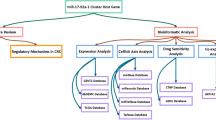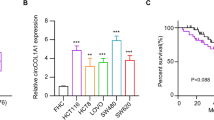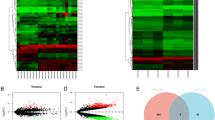Abstract
Background
Human microRNA 452 (MIR452) has been linked to both colorectal cancer (CRC) tissues and dextran sulfate sodium (DSS)-induced colitis.
Objective
We analyzed the correlation between MIR452 and its putative target gene in human CRC cells and in mouse colitis tissues.
Methods
Luciferase reporter assay confirmed that Src homologous and collagen adaptor protein 1 (SHC1) is a direct target of MIR452. Furthermore, the expression of proteins or mRNA was assessed by immunohistochemical analysis, Western blot, or quantitative RT-PCR (qRT-PCR).
Results
We found that MIR452 has a potential binding site at 3′-UTR of SHC1. Likewise, MIR452 or siSHC1 transfection dramatically reduced the level of cellular SHC1 in CRC cells. The expression of SHC1 was frequently downregulated in both human CRC tissues and mouse colitis tissues. In CRC cells, we demonstrated that MIR452 regulated the expression of genes involved in the SHC1-mediated KRAS-MAPK signal transduction pathways.
Conclusion
These findings suggest a potential defense mechanism in which MIR452 regulation of the adaptor protein SHC1 maintains cellular homeostasis during carcinogenesis or chronic inflammation. Therefore, MIR452 may have therapeutic value for human early-stage CRC and colitis.





Similar content being viewed by others
Data availability
The datasets used and/or analyzed during the current study available from the corresponding author on reasonable request.
References
Alam SM, Rajendran M, Ouyang S, Veeramani S, Zhang L, Lin MF (2009) A novel role of Shc adaptor proteins in steroid hormone-regulated cancers. Endocr Relat Cancer 16:1–16
Alam KJ, Mo JS, Han SH, Park WC, Kim HS, Yun KJ, Chae SC (2017) MicroRNA 375 regulates proliferation and migration of colon cancer cells by suppressing the CTGF-EGFR signaling pathway. Int J Cancer 141:1614–1629
Ambros V (2004) The functions of animal microRNAs. Nature 431:350–355
Bartel DP (2004) MicroRNAs: genomics, biogenesis, mechanism, and function. Cell 116(2):281–297
Bray F, Ferlay J, Soerjomataram I, Siegel RL, Torre LA, Jemal A (2018) Global cancer statistics 2018: GLOBOCAN estimates of incidence and mortality worldwide for 36 cancers in 185 countries. CA Cancer J Clin 68:394–424
Chen Z, Liu S, Tian L, Wu M, Ai F, Tang W, Zhao L, Ding J, Zhang L, Tang A (2015) miR-124 and miR-506 inhibit colorectal cancer progression by targeting DNMT3B and DNMT1. Oncotarget 6(35):38139–38150
Derfoul A, Juan AH, Difilippantonio MJ, Palanisamy N, Ried T, Sartorelli V (2011) Decreased microRNA-214 levels in breast cancer cells coincides with increased cell proliferation, invasion and accumulation of the Polycomb Ezh2 methyltransferase. Carcinogenesis 32:1607–1614
Elson CO, Sartor RB, Tennyson GS, Riddell RH (1995) Experimental models of inflammatory bowel disease. Gastroenterol 109:1344–1367
Farraye FA, Odze RD, Eaden J, Itzkowitz SH (2010) AGA technical review on the diagnosis and management of colorectal neoplasia in inflammatory bowel disease. Gastroenterol 138:746–774
Fiocchi C (1998) Inflammatory bowel disease: etiology and pathogenesis. Gastroenterol 115:182–205
Flynn DC (2001) Adaptor proteins. Oncogene 20:6270–6272
Garzon R, Fabbri M, Cimmino A, Calin GA, Croce CM (2006) MicroRNA expression and function in cancer. Trends Mol Med 12:580–587
Gu H, Neel BG (2003) The “Gab” in signal transduction. Trends Cell Biol 13(3):122–130
Gupta K, Jones JC, Farias VDA, Mackeyev Y, Singh PK, Quiñones-Hinojosa A, Krishnan S (2022) Identification of Synergistic drug combinations to target KRAS-driven chemoradioresistant cancers utilizing tumoroid models of colorectal adenocarcinoma and recurrent glioblastoma. Front Oncol 12:840241
Han SH, Mo JS, Park WC, Chae SC (2019) Reduced microRNA 375 in colorectal cancer upregulates metadherin-mediated signaling. World J Gastroenterol 25(44):6495–6507
Kasinski AL, Slack FJ (2011) MicroRNAs en route to the clinic: progress in validating and targeting microRNAs for cancer therapy. Nat Rev Cancer 11:849–864
Knauf JA, Kuroda H, Basu S, Fagin JA (2003) RET/PTC-induced dedifferentiation of thyroid cells is mediated through Y1062 signaling through SHC-RAS-MAP kinase. Oncogene 22(28):4406–4412
Lemmon MA, Schlessinger J (2010) Cell signaling by receptor tyrosine kinases. Cell 141(7):1117–1134
Li T, Jian X, He H, Lai Q, Li X, Deng D, Liu T, Zhu J, Jiao H, Ye Y (2018) MiR-452 promotes an aggressive colorectal cancer phenotype by regulating a Wnt/β-catenin positive feedback loop. J Exp Clin Cancer Re 37:238
Lin X, Han L, Gu C, Lai Y, Lai Q, Li Q, He C, Meng Y, Pan L, Liu S (2021) MiR-452-5p promotes colorectal cancer progression by regulating an ERK/MAPK positive feedback loop. Aging 13(5):7608–7626
Luoa LY, Hahn WC (2015) Oncogenic signaling adaptor proteins. J Genet Genomics 42(10):521–529
Ma L, Ma S, Zhao G, Yang L, Zhang P, Yi Q, Cheng S (2016) miR-708/LSD1 axis regulates the proliferation and invasion of breast cancer cells. Cancer Med 5:684–692
Mantovani A (2010) Molecular pathways linking inflammation and cancer. Curr Mol Med Actions 10(4):369–373
Mantovani A, Allavena P, Sica A, Balkwill F (2008) Cancer-related inflammation. Nature 454:436–444
Migliaccio E, Mele S, Salcini AE, Pelicci G, Lai KM, Superti-Furga G, Pawson T, Di Fiore PP, Lanfrancone L, Pelicci PG (1997) Opposite effects of the p52shc/p46shc and p66shc splicing isoforms on the EGF receptor-MAP kinasefos signalling pathway. EMBO J 16:706–716
Migliaccio E, Giorgio M, Mele S, Pelicci G, Reboldi P, Pandolfi PP, Lanfrancone L, Pelicci PG (1999) The p66shc adaptor protein controls oxidative stress response and life span in mammals. Nature 402(6759):309–313
Mo JS, Chae SC (2021) MicroRNA 452 regulates ASB8, NOL8, and CDR2 expression in colorectal cancer cells. Genes Genomics 43:33–41
Mo JS, Alam KJ, Kang IH, Park WC, Seo GS, Choi SC, Kim HS, Moon H, Yun KJ, Chae SC (2015) MicroRNA 196B regulates FAS-mediated apoptosis in colorectal cancer cells. Oncotarget 6:2843–2855
Mo JS, Alam KJ, Kim HS, Lee YM, Yun KJ, Chae SC (2016) MicroRNA 429 regulates mucin gene expression and secretion in murine model of colitis. J Crohns Colitis 10:837–849
Mo JS, Han SH, Yun KJ, Chae SC (2018) MicroRNA 429 regulates the expression of CHMP5 in the inflammatory colitis and colorectal cancer cells. Inflamm Res 67(11–12):985–996
Mo JS, Park WC, Choi SC, Yun KJ, Chae SC (2019) MicroRNA 452 regulates cell proliferation, cell migration, and angiogenesis in colorectal cancer by suppressing VEGFA expression. Cancers 11:1613
O’Keefe SJ (2016) Diet, microorganisms and their metabolites, and colon cancer. Nat Rev Gastroenterol Hepatol 13:12
Pawson T, Scott JD (1997) Signaling through scaffold, anchoring, and adaptor proteins. Science 278:2075–2080
Pelicci G, Lanfrancone L, Grignani F, McGlade J, Cavallo F, Forni G, Nicoletti I, Grignani F, Pawson T, Pelicci PG (1992) A novel transforming protein (SHC) with an SH2 domain is implicated in mitogenic signal transduction. Cell 70:93–104
Pomerleau V, Landry M, Bernier J, Vachon PH, Saucier C (2014) Met receptor-induced Grb2 or Shc signals both promote transformation of intestinal epithelial cells, albeit they are required for distinct oncogenic functions. BMC Cancer 14:240
Salcini AE, McGlade J, Pelicci G, Nicoletti I, Pawson T, Pelicci PG (1994) Formation of Shc-Grb2 complexes is necessary to induce neoplastic transformation by overexpression of Shc proteins. Oncogene 9(10):2827–2836
Shi W, Zhang G, Ma Z, Li L, Liu M, Qin L, Yu Z, Zhao L, Liu Y, Zhang X et al (2021) Hyperactivation of HER2-SHCBP1-PLK1 axis promotes tumor cell mitosis and impairs trastuzumab sensitivity to gastric cancer. Nat Commun 12:2812
Stevenson LE, Ravichandran KS, Frackelton AR Jr (1999) Shc dominant negative disrupts cell cycle progression in both G0–G1 and G2-M of ErbB2-positive breast cancer cells. Cell Growth Differ 10(1):61–71
Tulpule A, Guan J, Neel DS, Allegakoen HR, Lin YP, Brown D, Chou YT, Heslin A, Chatterjee N, Perati S (2021) Kinase-mediated RAS signaling via membraneless cytoplasmic protein granules. Cell 184(10):2649–2664
Ungaro R, Mehandru S, Allen PB, Peyrin-Biroulet L, Colombel JF (2017) Ulcerative colitis. Lancet 389:1756–1770
Ullman TA, Itzkowitz SH (2011) Intestinal inflammation and cancer. Gastroenterol 140:1807–1816
Wary KK, Mainiero F, Isakoff SJ, Marcantonio EE, Giancotti FG (1996) The adaptor protein Shc couples a class of integrins to the control of cell cycle progression. Cell 87(4):733–743
Xavier RJ, Podolsk DK (2007) Unraveling the pathogenesis of inflammatory bowel disease. Nature 448(7152):427–434
Zheng Y, Zhang C, Croucher DR, Soliman MA, St-Denis N, Pasculescu A, Taylor L, Tate SA, Hardy WR, Colwill K et al (2013) Temporal regulation of EGF signalling networks by the scaffold protein Shc1. Nature 499:166–171
Acknowledgements
The biospecimens for this study were provided by the Biobank of Wonkwang University Hospital, a member of the National Biobank of Korea, which is supported by the Ministry of Health and Welfare. This research was supported by Wonkwang University in 2021.
Funding
This research was supported by Wonkwang University in 2021.
Author information
Authors and Affiliations
Contributions
The authors confirm contribution and declaration to the paper are as follows: Study concepts, design, draft the manuscript, and revised it critically: S-CC. Performed the experiments, data collection, interpretation and analysis of results: J-SM and S-CC. Contributed reagents/materials and discussion: SL and K-JY.
Corresponding author
Ethics declarations
Conflict of interest
The authors have no conflict of interest to disclose.
Ethical approval
All procedures involving human subjects were examined and endorsed in accordance with the Ethical Standards set by the Committee of Ethical Standards of Wonkwang University, Republic of Korea (WKIRB-201703-BR-010). The consent for the animal experiments was approved by the Institutional Animal Care and Use Committee (WKU17-53).
Additional information
Publisher's Note
Springer Nature remains neutral with regard to jurisdictional claims in published maps and institutional affiliations.
Supplementary Information
Below is the link to the electronic supplementary material.
Rights and permissions
Springer Nature or its licensor (e.g. a society or other partner) holds exclusive rights to this article under a publishing agreement with the author(s) or other rightsholder(s); author self-archiving of the accepted manuscript version of this article is solely governed by the terms of such publishing agreement and applicable law.
About this article
Cite this article
Mo, Js., Lamichhane, S., Yun, Kj. et al. MicroRNA 452 regulates SHC1 expression in human colorectal cancer and colitis. Genes Genom 45, 1295–1304 (2023). https://doi.org/10.1007/s13258-023-01432-3
Received:
Accepted:
Published:
Issue Date:
DOI: https://doi.org/10.1007/s13258-023-01432-3




